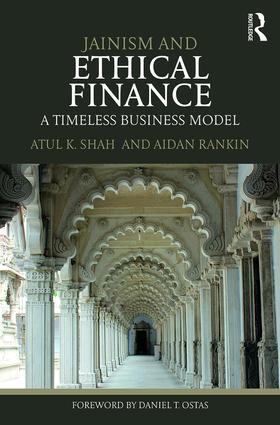
Naomi Fowler ■ Jainism and Ethical Finance

“The financial crisis of 2008 has led to a re-evaluation of the role of financial institutions and their relationship with the wider economy and society. There is an increased questioning of both the conduct of business itself and the principles behind commercial and financial activities. Yet non-western voices have been notably absent from this debate, as have alternatives to the dominant western-derived economic ideologies.”
This is part of the description of a new book by Senior Lecturer in Accounting & Finance at the University of Suffolk, Atul K. Shah PhD (also author of ‘Celebrating Diversity’). His latest book is co-written with Dr Aidan Rankin and is called Jainism and Ethical Finance: A Timeless Business Model.
 We hand over to him to explain more about it:
We hand over to him to explain more about it:
Public concern about ethics in business and the professions is very high. However, ‘solutions’ so far have only appeared in the forms of codes of ethics, or processes and systems designed to ‘follow the law’. We all know what that has meant in the area of tax – exploit every gap in the law to avoid paying anything for public services. Issues like culture and character have proven very hard to discuss and transform. One reason is that most of the debate has been a monologue – it has been dominated by western culture and a world-view of individualism, materialism and profit maximisation.
My latest research book with Dr. Aidan Rankin, draws upon 30 years of work in transforming global awareness of one of the oldest living cultures of the world – the Jain culture, and its profound wisdom for sustainable living. It is called Jainism and Ethical Finance. It is an ethic and wisdom which is at once scientific and spiritual, holistic and inclusive, and extremely relevant to the challenges we face today. At the same time, Jains make one of the largest per capita community of accountants, financiers and entrepreneurs in the world – yet they operate quietly and simply, that is why they remain unnoticed. Finance has been in their DNA for centuries. In India, they remain one of the highest taxpayers – despite being less than 0.5% of the population, they pay 25% of all taxes.
Our book is aimed at helping students and scholars learn about this culture, understand its core philosophy and science, and see its practical application and relevance in contemporary finance. It combines both theory and practice, bringing to life true stories and cases studies of how Jains have influenced local and global enterprises, and continue to do so. It is hoped that the book will be an exemplar for future studies which revive timeless wisdoms from all over the world, and show how they are lived and practiced in finance and business today. In our rush for enlightenment and freedom, we have forgotten the wisdom of the East, and its history of enquiry, meditation and experimentation, which has given the world some timeless gems.
The focus on technical education in accounting and finance is a major drawback as it removes the possibility of dialogue and debate around personal experiences, cultures and ‘values’. In fact, it even makes it impossible for students to be critical or questioning about basic assumptions and actions of business. Yes our focus on ‘value’ has really emptied our reflection on ‘values’. That is why the debates on ethics are so dry because they often lack references to lived cultures, communities and behaviours. Also focusing solely on business or finance is not an ideal way to learn ethics as often the parameters are restricted by profits and performance – some would say business eats culture for a living. Speaking of living faiths, cultures and communities gives us a much better alternative way of understanding ethics, and thereby transforming professional conduct and behaviour organically. Jainism and Ethical Finance could start you on the journey.
The practical benefits of reading our book are primarily in terms of thinking differently about finance, about ethics and also about culture and sustainability. The language in the book is simple and accessible, but the ideas draw from deep wells of thought and philosophy. The stories and examples bring the Jain philosophy to life, helping readers reflect on how they can live and act differently. The research is not presented as a dogma or grand theory but as an open resource for personal creativity and inspiration. Some readers may even decide to question their colleagues at work about their own culture and practices around finance, and how social capital contributes to building lasting success and happiness. Perhaps when you recruit someone, you may now have some new questions to ask. Readers may learn to see the value of a few good long-term relationships, and understand the patience required in nurturing them and keeping them. The book will make you reflect on death and materialism, seeing that life can easily become a self-imposed prison, rather than an opportunity for freedom and creativity. We hope you will embark on the adventure, and read the book to free yourself from the chains of greed, envy and vice.
The book can be obtained directly from Routledge and they’re currently offering a 20% discount to everyone.
Related articles

The secrecy enablers strike back: weaponising privacy against transparency
Privacy-Washing & Beneficial Ownership Transparency
26 March 2024

Ireland (again) in crosshairs of UN rights body

Tax policy and gender disparity: A call to action on International Women’s Day 2024

Policy research conference: How a UN Tax Convention can address inequality in Europe and beyond

The IMF’s anti-money laundering strategy review is promising, but it all comes down to implementation

Inequality Inc.: How the war on tax fuels inequality and what we can do about it
Proposal for ‘Business in Europe: Framework for Income Taxation’ (BEFIT): A wrong turn in the right direction
2 February 2024
Formulary apportionment in BEFIT: A path to fair corporate taxation
31 January 2024


